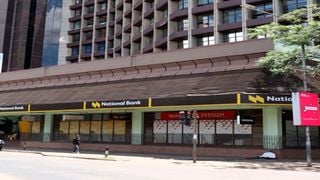
National Bank branch on Kenyatta Avenue Nairobi. FILE PHOTO | DENNIS ONSONGO | NMG
|Business
Premium
Revealed: KCB Group inks deal to sell National Bank
KCB Group is selling its subsidiary National Bank of Kenya (NBK) for an undisclosed amount less than five years after it acquired the lender in a rescue deal that was shepherded by the National Treasury and the Central Bank of Kenya.
KCB, which will Wednesday evening be releasing its financial results for the year ended December, is expected to formally announce the sale of NBK to a Nigerian lender at the same event, according to sources familiar with the matter.
The Central Bank of Kenya (CBK), whose approval will be required, has been notified of the proposed transaction whose value was not disclosed.
This publication sought a comment from KCB on the deal but the lender preferred not to make any on such a material development. The proposed deal comes at a time when prospects for medium to large Kenyan banks have brightened with the introduction of risk-based lending, cooling inflation and a strengthening shilling.
Banks with capital shortfalls may however fail to fetch top dollar though a motivated buyer can pay a premium to gain control of an ongoing business with a substantial base of customers. NBK had a book value of Sh10.6 billion as of September 2023.
Shareholders of healthy banks have been selling their stakes at a major premium above the valuation indicated by the share prices on the Nairobi Securities Exchange (NSE).
UK development finance institution, British International Investment, recently received Sh6.5 billion from the sale of its 10.13 percent stake in I&M Group to private equity firm Africinvest, getting twice the value of what the shares were trading at the time of concluding the transaction.
KCB acquired NBK in October 2019 in a share swap deal that saw the former issue 147.3 million shares worth Sh6 billion then to the former owners of the subsidiary.
The former owners of NBK included the Treasury and the National Social Security Fund (NSSF) that ended up boosting their stakes in the acquirer when the deal was concluded. NBK was in a weak capital position and had been posting losses for years with its absorption into the better-capitalised KCB Group seen as a means of solving its problems that partly arose from a legacy of decades of political interference and poor credit risk management.
KCB would go on to invest billions of shillings in NBK but the capital adequacy problem has persisted, with the subsidiary posting a Sh3 billion net loss in the nine months ended September 2023.
NBK had received a cumulative Sh12.5 billion from KCB as of last year in the form of debt and equity capital, indicating that the acquisition will take more time before paying off.
KCB had earlier announced it would integrate NBK into its existing local operation – KCB Bank Kenya — but later decided to let the two institutions run as standalone businesses.
This has made it easier to sell NBK which handles a lot of government business. KCB Bank Kenya is also a major banker to government entities in addition to a more diverse base of clients in retail and corporate banking.
NBK's net loss in the nine months to September last year reversed a net profit of Sh807 million a year earlier, according to disclosures in KCB Group's financial statements for the period.
The loss was partly driven by legacy issues, including a Sh2.3 billion payment to Basil Criticos, a former Member of Parliament, as compensation for auctioning his sisal farm about 17 years ago.
The High Court last year ordered NBK to pay the former MP the money as compensation for auctioning his sisal farm 15 years ago.
NBK, on the back of the loss, closed the period in breach of three regulatory capital ratios that measure the stability of a bank. These are the core capital to total deposits, core capital to total risk-weighted assets and total capital to total risk-weighted assets.
Partly due to the consolidation of NBK, the asset quality of KCB Group has been weaker than the industry average with the share of gross defaults to total loans at 17.8 percent. as of September 2023.




